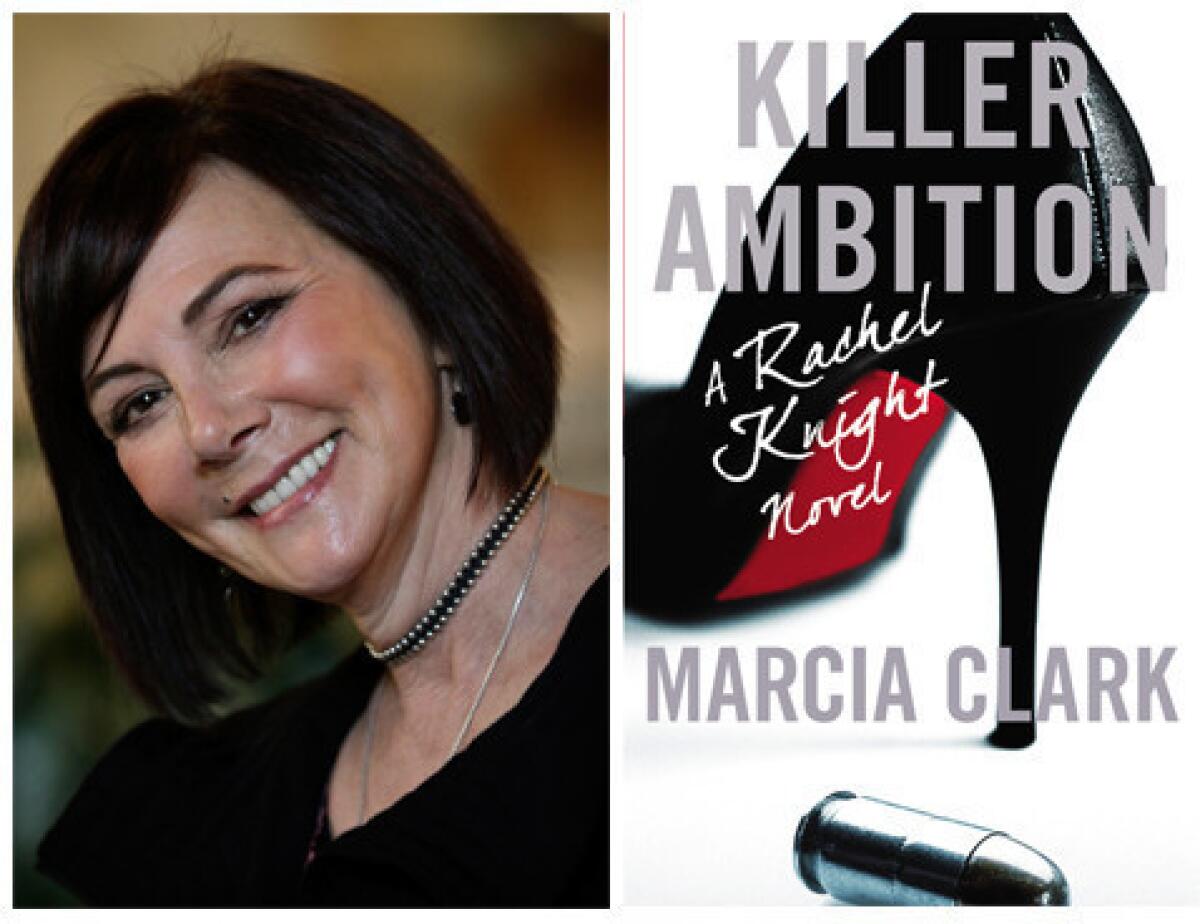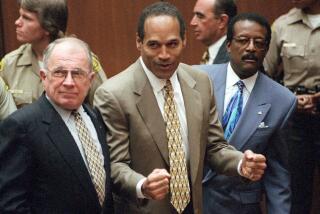Marcia Clark’s ‘Killer Ambition’ a rocky, entertaining case

No one knows celebrity murder trials better than Marcia Clark, the former prosecutor in the L.A. County district attorney’s Special Trials Unit. Clark’s watershed case, the 1995 Nicole Brown Simpson-Ron Goldman homicide trial, became know as the Trial of the Century for O.J. Simpson, its celebrity defendant, and its gavel-to-gavel coverage on media outlets around the world. Clark and her DA colleagues famously lost the case amid allegations of mishandled DNA evidence and misconduct by the LAPD. In “Without a Doubt,” her bestselling memoir centering on the Simpson trial, Clark blamed Simpson’s acquittal in part on an American justice system that, among other ills, was “corrupted by celebrity.”
Clark, however, took the bitter with the better and put her experience to good use as a criminal appellate lawyer, legal analyst, expert commentator and, since 2011, crime novelist. “Killer Ambition,” the third in a series featuring deputy District Atty. Rachel Knight of the L.A. County DA’s Special Trials Unit, draws on the author’s experience in the courtroom and her knowledge of celebrity prosecutions.
The first half of the book details the disappearance of Hayley Antonovich, whose father, Russell, is an über-powerful Hollywood director. A brief, third-person prologue sets up the crime and back story of the teenage Hayley, whose heart of gold is remembered by her bestie Mackenzie Struthers, a kid from a less well-heeled family.
The narrative quickly shifts to Rachel’s first-person account of the investigation, which begins when her LAPD colleague — and good girlfriend — Det. Bailey Keller gets called to the Antonovich home in Bel-Air after the $1-million ransom Russell paid two hours before did not result in the return of his missing daughter. Rachel, who is sharing drinks with the off-duty Bailey when the call comes in, rides with her to meet the Antonoviches and their layers of management and personal assistants, where she sees through the Hollywood posturing: “Suddenly the celebrity director was just the frantic, distraught father of a child in danger.”
Bailey and Rachel launch an intense investigation that soon focuses on Brian Shandling, Hayley’s newly acquired boyfriend with a shady past, and others who may have had a motive, such as Brittany Caren, a fragile, drug-addicted young actress who worked with Russell as a teenager. But who among the many people a Hollywood power broker like Russell might have encountered, Rachel asks, would be crazy enough to kidnap his daughter?
“It’s a town full of narcissists and sociopaths,” Ian Powers, Russell’s longtime manager and a former child star, notes. “You do the math.”
As Rachel and Bailey peel away the layers, a body, then two are found and a more complicated and darker motive emerges, with the Antonovich family, their friends and various Hollywood insiders hiding a lot more than they initially let on.
While such involvement by the DA’s office so early in a case mirrors Clark’s own unusual role in the early days of the Simpson-Goldman investigation, readers of other L.A.–based procedurals may feel Rachel’s active participation is suspiciously convenient, especially when she discovers evidence overlooked by LAPD and forensic investigators in the field or takes the lead in interviewing key witnesses while the otherwise seasoned homicide detective Bailey too often takes a back seat and her LAPD colleagues are confined to working largely off-stage.
Equally jarring is the questionable logic that drives Rachel and Bailey to interview informants far removed from the main action, which conveniently yields information or evidence that brings them closer to an arrest. Not to mention the way in which secondary characters — like Rachel’s off-again, on-again boyfriend LAPD Lt. Graden Hales or Declan Shackner, Rachel’s second chair during the trial — are possessed of back stories that come in handy at just the right moment (conflicts of interest notwithstanding).
Yet once Rachel is in the courtroom, she is in her element and “Killer Ambition” gathers momentum that makes the rocky road to the identification of the culprits and their arrest almost forgivable. It is in the courtroom that Clark fully explores the corruption that accompanies celebrity and traces how it infects every aspect of a trial, from jury selection to the motives, machinations and missteps of the various attorneys, consultants and experts.
In the process, “Killer Ambition” presents a refreshing and suspenseful portrayal of high-stakes trials, criminal lawyers on both sides of the aisle and the strategies behind their every move. And while the novel has its shortcomings, Rachel and her posse of girlfriends, colleagues and their love interests are engaging enough to hope for their continued growth and success in investigations that are equal to Rachel, and author Clark’s, many and formidable talents in the courtroom.
A member of the National Book Critics Circle, Woods is the author and editor of eight books, including four novels in the Charlotte Justice mystery series.
Killer Ambition
Marcia Clark
Mulholland Books: 448 pp., $25.99
More to Read
Sign up for our Book Club newsletter
Get the latest news, events and more from the Los Angeles Times Book Club, and help us get L.A. reading and talking.
You may occasionally receive promotional content from the Los Angeles Times.






